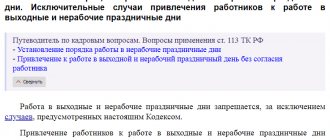16.09.2019
0
24
4 min.
The protection of citizens' labor rights affects all aspects of the relationship between the parties. Direct measures are prescribed in regulations, the main one of which remains the Labor Code. In particular, Article 60 of the Labor Code of the Russian Federation stipulates the possibility of assigning some additional work to an employee. The conditions under which this is permitted and the procedure for carrying out the procedure are indicated here. The position held, specialization and other factors are taken into account. The key requirement is voluntariness, confirmed by written consent. In its absence, management’s instructions are (legally) void, and their failure to comply does not entail consequences.
Another comment on Art. 60.1 of the Labor Code of the Russian Federation
1. The constitutional principle of freedom of labor, which presupposes the right of everyone to freely dispose of their abilities to work, choose their type of activity and profession (Article 37 of the Code of the Russian Federation), is manifested, in particular, in the ability of a person to determine those organizational and legal forms in which he intends to realize his ability to work (independent (entrepreneurial) or dependent work; work under civil law contracts or employment contracts), as well as the possibility of freely combining them. Work under civil law or labor contracts can be performed in favor of one person (customer, employer) or in favor of different persons. Part-time work occurs if the employee works under at least two employment contracts. Carrying out work under labor and civil law contracts, regardless of whether the customer (employer) is the same person or different persons, is not considered a part-time job. Part-time work in accordance with Art. 60.1 of the Labor Code of the Russian Federation is regular paid work carried out under the relevant employment contract in free time from the main job.
2. Labor legislation of the period of real socialism limited combinations in every possible way. This limitation was carried out both in quantitative terms (by the number of employment contracts concluded as part-time workers) and by the subject composition and content of the labor function (by combined types of work and its quality). On the contrary, the principle of freedom of labor proclaimed by the current Constitution of the Russian Federation presupposes the free determination by the person exercising the ability to work of both the circle of employers and the types of labor and its quality (qualification) performed within the framework of the relevant labor function. Restrictions on freedom of labor in this area are carried out exclusively by law and only to the extent that this corresponds to general social interests.
Accordingly, the current labor legislation does not limit part-time work from the point of view of the circle of employers, distinguishing only between internal and external part-time work. Internal part-time work is regular paid work performed under an employment contract concluded with the same employer who is a party to the main employment contract. External part-time work is work under an employment contract concluded with another employer. In this case, the main employment contract is considered to be the one that determines the employee’s place of work as the main one. In turn, the main place of work is determined by at least two characteristics. Firstly, from a formal legal point of view, it is at the main place of work that the employee’s work book is stored (this sign is important for determining the main place of work for external part-time work). Secondly, part-time work is carried out in free time from the main job, i.e., as a rule, outside the normal working hours. It should, however, be borne in mind that these two characteristics should be considered in conjunction, because each of them separately does not always matter. In particular, a situation is possible when an employee, at the place of work where he has a work book, works part-time (for example, four hours a week) and at the same time is employed full-time under a second employment contract; under such conditions, the first of the named places of work will be considered the main one.
At present, there are no regulatory restrictions on the types and quality (qualification) of combined labor, i.e. according to the content of the labor function assigned to the employee for the main and combined work. In the same way, as a general rule, the number of working hours that can be performed by an employee on a part-time basis is not currently subject to regulation.
3. For the specifics of regulating the labor of persons working part-time, see the articles in Chapter. 44 of the Labor Code of the Russian Federation and commentary thereto; Art. 276 of the Labor Code of the Russian Federation and commentary to it.
Legal provisions
The law, namely Article 60, establishes the combination of professions according to the Labor Code of the Russian Federation. The order and scope of what is permissible is indicated here. In particular, the main text prohibits requiring an employee to take actions not provided for in the employment agreement. Such an obligation occurs only in the form of exceptions related to force majeure, such as accidents, disasters and the elimination of their consequences.
Other provisions of this article allow the conclusion of agreements establishing part-time work. It means that the activity is carried out in the time free from performing main duties. External and internal part-time work is assumed, that is, an agreement with your own or a third-party employer.
The law also provides for combinations when activities take place during regular working hours. Usually it is facilitated by a similar profession or range of responsibilities. Without the written consent of a citizen, it is impossible to impose the corresponding functions on him. In turn, either party has the right to refuse to fulfill the conditions by notifying the other participant in advance. We are talking about a period of three days before the actual termination.
What is called freedom of labor?
It is important to know! The provisions stipulated by Article 60 of the Labor Code of the Russian Federation go back to the constitutional principle of freedom of labor.
In the Russian Basic Law they are prescribed by Art. 37. In fact, we are talking about a complete ban on forced work. This fact is a gross violation of human rights and entails consequences for the violator. In addition, the citizen is expected to have complete freedom in terms of choosing a profession and type of activity.
The term labor functions
Stopping the ban on violation of citizens' rights in terms of freedom from forced labor, legislation represented by Art. 57 of the Labor Code of the Russian Federation prescribes the concept of labor function. It is defined as the range of responsibilities enshrined in the contract. It specifies the employee’s activities by position or area. For example, the agreement may state that the person is a consultant. As an option, he is entrusted with the maintenance of electrical communications, which is also reflected in the contract.
Exceptions to the rules
The strict ban on involving a citizen in other activities (not specified in the agreement) has several exceptions. The change in function is prescribed in Art. 72 of the Labor Code of the Russian Federation, being entirely related to force majeure circumstances (accidents, disasters, epidemics) and the elimination of their consequences. This is the only situation that does not require human consent, but the period of its involvement is limited to one month. Payment is made for the work performed, but the amount cannot be lower than for the main activity.
Combination of positions concept and registration procedure
In accordance with the provisions of labor legislation, combining positions means the performance of professional activities by one employee of functions that are supposed to be performed by two employees. It is assumed that part-time work can take place both within one structure and at external enterprises. The procedure for carrying out the corresponding procedure in one organization is regulated by relevant regulations. Therefore, to find out how to formalize the combination of positions at one enterprise, you should refer to the legislative provisions.
First of all, the employer must prepare a vacant post, and also decide on the candidacy of a subordinate who will work double duty. It should be borne in mind that the profession must be free; Next, the employer is obliged to issue a notice in accordance with which he notifies the employee about the additional post offered to him; Obtain the consent of the subordinate to work in this mode. The employee must notify the employer only in writing. Moreover, you should know that a full-time employee has the opportunity to independently nominate himself for additional duties. The worker must indicate his initiative in the content of the application; After the appropriate stages have passed, an additional agreement to the existing employment contract must be drawn up
It is important to draw up such a document, since the employee’s working conditions change. It is recommended that the content of the agreement outline the key points of cooperation between the parties on new terms; The final stage will be the issuance of an order in which the employer is obliged to inform about the changes taking place.
The indicated act must be signed by all parties involved.
Combining positions in one organization - payment according to the Labor Code of the Russian Federation 2018
In accordance with the provisions of the Labor Code of the Russian Federation, additional payments are expected to be provided to such an employee for the implementation of additional work functions. Payment for combining positions at one enterprise is made by prior agreement of the parties. The Labor Code of the Russian Federation states that the amount of additional payment for combining positions is calculated depending on the length of time worked by a subordinate. Thus, if an employee temporarily replaced a colleague due to his illness, business trip or other circumstances, he is entitled to payment of additional funds.
You should also keep in mind some features of providing payment for work in an additional profession. If there is a need to replace the head of the organization for some time, then his professional responsibilities are temporarily assigned to his direct deputies. In this case, there is no need for monetary compensation for such activities, since performing these functions is the direct responsibility of the assistants.
At the time of refusal of such work in accordance with Art. 379 of the Labor Code of the Russian Federation, the employee retains all rights provided for by labor legislation and other acts containing labor law norms. According to Art. 380 of the Labor Code of the Russian Federation, employers and employer representatives do not have the right to prevent employees from exercising self-defense of labor rights.
In what cases is self-defense possible? Only in cases directly provided for by the Labor Code. Other federal laws may also provide for the right to self-defense, but have not yet been adopted. According to the Labor Code of the Russian Federation, self-defense is possible in 3 cases: 1) in case of delay in payment of wages for a period of more than 15 days (Article 142 of the Labor Code of the Russian Federation), 2) in the case of assignment of work that directly threatens the life and health of the employee (Article 220 , Article 379 of the Labor Code of the Russian Federation), 3) in case of assignment of work not provided for by the employment contract (Article 60, Article 379 of the Labor Code of the Russian Federation).
Must an employee notify the employer about self-defense? In order for refusal to work to not be regarded as a disciplinary offense, the employee must notify the employer or his immediate supervisor about it in writing, in this notice one must refer to Art. 379 or art. 142 of the Labor Code and describe as specifically as possible the situation that caused the refusal. Be sure to make sure that your notice is received by the employer. To do this, either receive an acceptance stamp on your copy of the notice, or send the notice by registered mail or telegram.
What guarantees does an employee have who refuses to work in self-defense? Depending on the situation that caused the refusal of work, different guarantees are established.
Situation one. Self-defense in case of delay in payment of wages for more than 15 days.
According to Art. 142 of the Labor Code of the Russian Federation, in case of delay in payment of wages for a period of more than 15 days, the employee has the right, by notifying the employer in writing, to suspend work for the entire period until the delayed amount is paid. During the period of suspension of work, the employee has the right to be absent from the workplace during his working hours.
An employee who was absent from the workplace during his working hours during the period of suspension of work is obliged to return to work no later than the next working day after receiving written notification from the employer of his readiness to pay the delayed wages on the day the employee returns to work. In this case, the employer is obliged to accrue interest for the delay in payment of wages (1).
Before exercising your right to self-defense, make sure that: 1) 15 days have actually expired; to do this, carefully read your employment contract, the Regulations on Remuneration or other internal document of the employer that establishes the terms for payment of wages. According to the Labor Code of the Russian Federation, salaries are paid at least every half month. If the payment day falls on a weekend or holiday, then the salary must be paid on the eve of this day and not later (Article 136 of the Labor Code of the Russian Federation);
2) the fact that you do not work in bodies and organizations where work can be suspended even in accordance with Art. 142 of the Labor Code of the Russian Federation is prohibited.
In the event of a dispute about the amount of money that the employer must pay you, do not rush to refuse work in accordance with Art. 142 Labor Code of the Russian Federation. For example, your employer pays you a salary, but does not pay you overtime or for working on holidays, or pays you a salary without a monthly bonus, which he previously paid regularly. In such cases, you can contact the labor inspectorate and (or) the court in order to recover these amounts. Use Art. 142 of the Labor Code of the Russian Federation, without creating risks for yourself, it is possible only in the case when all wages are delayed.
Situation two. Self-defense in case of assignment of work that directly threatens the life and health of the employee.
Article 220 of the Labor Code of the Russian Federation provides that an employee’s refusal to perform work in the event of a danger to his life and health due to violation of labor protection requirements or to perform heavy work and work with harmful and (or) dangerous working conditions not provided for in the employment contract does not entail subject him to disciplinary action.
Art. 220 of the Labor Code of the Russian Federation provides that if an employee refuses to perform work in the event of a danger to his life and health, the employer is obliged to provide the employee with another job while such danger is eliminated. If there is no such work, then, in our opinion, the employee should be compensated for his average earnings during the period of deprivation of the opportunity to work on the basis of Art. 234 Labor Code of the Russian Federation.
A situation of refusal to perform work arises in any case when the employer has not provided the employee with personal and collective protective equipment in accordance with established standards. If the employer has not provided the employee with protective equipment, then he has no right at all to demand that the employee perform work and must retain the employee’s average earnings until he is provided with work.
It is important that in this situation the employee does not have the right to leave his workplace during his working hours. You also need to very precisely formulate the work, the duties that you are refusing to perform, and for what reason you are refusing (explain exactly what required personal or collective protective equipment you were not given, etc.).
To take advantage of self-defense in this case, make sure that: - you did not sign for the missing protective equipment, otherwise there may be a risk that the employer will argue that he has fully fulfilled his duties to ensure protection, and you are wrongfully refusing to work.
Situation three. Refusal to work not covered by the employment contract.
Art. 60 of the Labor Code of the Russian Federation prohibits requiring an employee to perform work not provided for in the employment contract. According to Art. 220 of the Labor Code of the Russian Federation, an employee’s refusal to perform heavy work and work with harmful and (or) dangerous working conditions not provided for in the employment contract does not entail bringing him to disciplinary liability.
In this case, in the notice you write that you refuse to perform only the work that is not provided for in your employment contract, and not work at all. It is advisable to very precisely formulate the assignment that you refuse to carry out, indicate who gave it, and also express your readiness, both in writing and orally, to carry out all the work that you agreed to do when applying for a job.
To take advantage of self-defense in this case, make sure that: - there is no dispute about the content of your work duties between you and your employer. Such a dispute may arise if your responsibilities are not specified in the employment contract, or there is no job description, or you signed that you are familiar with it, but have not seen it, etc.
In what cases can I not exercise the right of self-defense?
The right to self-defense is not absolute and is subject to limitations. Sometimes an employer may require you to perform work not covered by the employment contract. This is a rare case - a temporary transfer due to production needs, which is caused by emergency circumstances (see for more details Parts 2-4 of Article 72_2 of the Labor Code of the Russian Federation). Sometimes you may be forced to work beyond the working hours you agreed to: this is overtime work and work on weekends and holidays, to which you may be required to do so if there are grounds specified in the law (they are also of an emergency nature). See article for more details on this. 99 and art. 113 Labor Code of the Russian Federation.
Suspension of work in case of delay in wages, according to Art. 142 of the Labor Code of the Russian Federation, it is not allowed:
during periods of martial law, a state of emergency or special measures in accordance with the legislation on a state of emergency;
in the bodies and organizations of the Armed Forces of the Russian Federation, other military, paramilitary and other formations and organizations in charge of ensuring the country's defense and state security, emergency rescue, search and rescue, fire-fighting work, work to prevent or eliminate natural disasters and emergency situations, in law enforcement agencies;
civil servants;
in organizations directly servicing particularly hazardous types of production and equipment;
employees whose job responsibilities include performing work directly related to ensuring the life of the population (energy supply, heating and heat supply, water supply, gas supply, communications, ambulance and emergency medical care stations).
If you belong to categories that cannot be suspended, then you can use the usual means of protecting your labor rights: - contact the prosecutor's office or labor inspectorate with a complaint about the actions of the employer. - file a lawsuit to recover the detained amount and interest on it.
Is the self-defense period subject to payment?
The Supreme Court of the Russian Federation explained that to an employee who was forced to suspend work due to a delay in payment of wages for a period of more than 15 days, the employer is obliged to compensate the average earnings he did not receive for the entire period of its delay with the payment of interest (monetary compensation) in the amount established by Art. 236 of the Labor Code. (See Review of legislation and judicial practice of the Supreme Court of the Russian Federation for the 4th quarter of 2009)
We believe that this legal position is also relevant in the event of an employee’s refusal to perform work when a danger to his life and health arises.
Appendices 1. Example of notice of suspension of work
General Director of Loskut'OK LLC Ivan Ivanovich Ivanov
From electrician Petrov Petrovich
Notice of suspension of work in accordance with Art. 142 Labor Code of the Russian Federation
I work _________ (specify position and department). Until now, I have not received a full calculation of wages for April 2008, meanwhile, according to the collective agreement (internal labor regulations, regulations on wages, employment contract - indicate what is required) wages are paid at least every half month: advance payment no later than On the 20th of each month due for payment, full payment of wages is due no later than the 5th day of each month following the month due for payment. Thus, I should have received wages for April on May 5, 2008. Today is May 25, 2008, the payment of wages is over 15 days late.
I hereby notify you of the suspension of work for the entire period until payment of the delayed amount and that I will be absent from my workplace.
I express my readiness to begin my work duties no later than the next working day after receiving written notification of my readiness to pay the delayed wages on the day of my return to work.
May 25, 2008 Signature
2. Example of a self-defense notice
General Director of Loskut'OK LLC Ivan Ivanovich Ivanov
From electrician Petrov Petrovich
Notification of self-defense in accordance with Art. 379 Labor Code of the Russian Federation
Option 1. I work as an electrician with a permit of up to 380 Volts, foreman Sirotkin I.A. On May 25, 2008, he assigned me to work with a higher voltage, while I do not have the appropriate permission to work with such voltage. I hereby notify you of my refusal to fulfill the specified order of I.A. Sirotkin. for the purpose of self-defense on the basis of Art. 379 of the Labor Code of the Russian Federation, since this work is not provided for in my employment contract. I express my readiness to begin performing the work provided for in my employment contract.
May 25, 2008 Signature
Option 2. I work as an electrician, foreman I.A. Sirotkin. On May 25, 2008, he assigned me to work on a high-voltage line in the absence of appropriate enhanced personal protective equipment, which creates an immediate threat to my life and health. I hereby notify you of my refusal to fulfill the specified order of I.A. Sirotkin. for the purpose of self-defense, on the basis of Art. 379 Labor Code of the Russian Federation. I express my readiness to begin performing the work provided for in my employment contract.
May 25, 2008 Signature (1) Interest (monetary compensation) in case of violation by the employer of the established deadline for payment of amounts due to the employee is calculated from an amount not less than one three hundredth of the refinancing rate of the Central Bank of the Russian Federation in force at that time on amounts not paid on time for each day of delay starting from the next day after the due date for payment until the day of actual settlement inclusive. The obligation to pay interest does not depend on whether the employer is at fault for the delay (Article 236 of the Labor Code of the Russian Federation).
Another commentary on Article 151 of the Labor Code of the Russian Federation
Combination of professions (positions) is the performance by an employee, along with his main work stipulated by the employment contract, of additional work in another profession (position). In such a situation, in addition to the main job, the employee performs other work within the working hours established for the main job due to the intensity (condensation) of work during the working day. Options for the possible combination of professions or positions are best fixed in a collective agreement, regulations on remuneration or other local act of the organization (see also Article 60.2 and commentary thereto).
In contrast to combining professions (positions), the performance by an employee of an additional amount of work in the same profession (position) is considered as an expansion of service areas or an increase in the volume of work performed.
The amount of additional payments for combining professions (positions) is established by the employer by agreement with the employee. The specific amount of the additional payment is reflected in the addendum to the employment contract. At the same time, it is indicated what kind of work and in what volume the employee will perform, whether the additional payment is established as a percentage of the tariff rate or salary or in an absolute amount, for what period this additional payment is established (month, six months, etc.). Moreover, the legislation does not establish either minimum or maximum sizes. At the same time, Part 2 of this article, based on the principle of payment according to work, determines that when establishing the amount of such additional payment, the parties to the employment contract must take into account the content and (or) volume of additional work assigned to the employee.
Assigning an employee, without releasing him from his main job, to perform the duties of an employee absent due to vacation, illness (and in other cases), who, in accordance with current legislation, retains his job, is fulfilling the duties of a temporarily absent employee. In this case, the employee, along with his main job, performs the duties of a temporarily absent employee within the working hours established for his main job by condensing his work during the working day. It is better to establish options for possible replacement of positions in a collective agreement, regulations on remuneration or other local act.
Employees who, for the same employer, perform, in addition to their main work stipulated by an employment contract, the duties of a temporarily absent employee without being released from their main job, are paid additionally for the performance of such duties. The amount of this additional payment is established by the employer by agreement with the employee. It is advisable to reflect the general procedure and amount of additional payments for performing the duties of temporarily absent employees in the collective agreement or regulations on remuneration of employees.
In addition, in each specific situation, an order is issued indicating: the volume of additional work to be performed; the period for performing the duties of a temporarily absent employee; a specific amount of additional payment (for example, 50% of the salary for the main job).
If the fulfillment of the duties of a temporarily absent employee by order is assigned equally to several employees, then the establishment of additional payment is possible both equally to each of them, and differentially depending on the specific volume of additional work performed by each employee (for example, one employee - 30%, another - 20%, the third - 50% of the official salary). In this case, the amount of additional payment to employees may be limited to the salary of a temporarily absent employee.
Exceptions to the general rule
Article 60 has two additional clauses that regulate prohibitions for different categories of positions.
Article 60.1 states that if a person has the desire and ability to work beyond what is specified in the contract, then he has the right to do this legally, namely in the case of an official combination of professions. Part-time work can be internal, in the same organization, and external, in another enterprise. The conditions of the part-time profession are specified in a separate contract for the part-time worker. The partner is paid for the obligations assumed in proportion to the duties performed.
Article 60.2 describes other exceptions.
It stipulates the following points:
- Temporary replacement of another employee, without interruption from his profession. That is, the employee also performs other related actions during the previously established working day. Such temporary combination of positions does not require changes or additions to the contract, but is formalized by an order with the assignment of additional payment.
- Temporary expansion of service areas.
- Increasing the volume of work.
The agreed upon points can only be temporary in nature and can be assigned to an employee of any position and profession only after his voluntary written consent.
Disasters, accidents, accidents
Force majeure circumstances are not planned in advance and, accordingly, cannot be eliminated according to plan. Therefore, workers may be involved in their elimination without prior approval. Article 60 of the Labor Code of the Russian Federation makes a reservation that changes can still be made in special cases. Emergency situations are those special cases when the employer is not obliged to stipulate a previously unplanned combination of professions.
By referring to Article 72.2, we can clearly outline the grounds that allow the employer, without the consent of the employee himself, to send him to perform functions in another profession.
This includes sending a worker to perform other work that does not correspond to his position in the event of disasters, industrial accidents, accidents, fires, earthquakes, etc.
Such a transfer is limited to a month and must be paid at a rate not lower than the average salary of the person being transferred.
Cancellation of additional payments for combining positions
The reasons for an employee to stop performing additional job duties assigned to him or her may be:
- Expiration of the period of time established by agreement of the parties;
- Hiring a key employee for an open vacant position;
- A person’s desire to give up such part-time work;
- The employer no longer has a need to perform such work.
How to remove the additional payment for combining positions in these cases? The cancellation process is quite simple:
- If the deadline expires, there is no need to notify the employee about this, nor should an additional order be issued.
- In all other cases, the issuance of a corresponding order from the lessor will be required.
When one of the parties initiates the termination of such labor relations, it is obliged to notify the other entity of its intention at least 3 days in advance.
Sample order for removal of additional payment for combining positions
The Labor Code of the Russian Federation does not establish a specific form of order to terminate the employment relationship of internal part-time workers and withdraw established additional payments from them. Therefore, when placing an order, you need to display the following information:
- Date and serial number of the document;
- Employer's name;
- Reason for canceling the combination;
- The day from which a person is released from bearing additional responsibilities and termination of payments;
- Manager's signature;
- Link to review the order of the interested party.
From the above it follows that when a subordinate performs a certain type of activity that is not included in his main functions, additional earnings are expected to be accrued. These funds are provided by the director in the manner established by legal acts.
Conditions allowing a change in labor function
There are several situations in which an employee’s job function changes. For example, this is a combination of professions under the Labor Code and other cases provided for by law. All of them require the consent of the person involved and financial motivation. This could be additional income or additional payment.
Part-time work
Part-time work is a form of additional employment for a person. It takes place during a temporary period free from performing primary duties. Registration should only be through an employment contract. It is concluded both with your employer, when this is considered an internal part-time job, and with a third-party company, then the form of employment is external. In any case, the employee is entitled to paid leave and other mandatory benefits.
Combination work
In the Labor Code, combining positions means that an employee during working hours performs activities in another profession or position. Usually these are related areas, for example, an electrician is also an equipment adjuster. An order is issued for the organization, which indicates the scope of responsibilities, the amount of work and the form of payment. The employee retains the right to refuse the combination at any time, but with notification to the employer 3 days in advance.
Expansion of job responsibilities
Article 60 of the Labor Code contains language related to an increase in the volume of work and service areas. In fact, here the speech is also related to the performance of duties in the main time, but in one’s profession. That is, there is simply an increase in activity. Written consent remains a prerequisite, and the employee has the right to refuse compliance at any time.
Temporary replacement
If for one reason or another an employee is absent (illness, business trip), his tasks can be temporarily assigned to a colleague. He performs them in parallel and together with the main activity at the same time. As in other cases, additional payment and written consent remain a prerequisite.
Combining positions in one organization; payment according to the Labor Code of the Russian Federation in 2018
Important
The entry in the work book must contain the name of the enterprise in which the employee was hired on a part-time basis. How to correctly make an entry in a part-time work book according to the Labor Code of the Russian Federation:
- Column 1 – enter the serial number of the entry.
- Column 2 – write the date the part-time worker was hired.
- Column 3 - it is indicated that such and such was hired by such and such organization (name) as a part-time worker and the names of his qualifications, position, etc. are indicated.
- Column 4 – write the name of the document on the basis of which entry No. 3 was made (for example, an order).
Time sheet A time sheet is a document that reflects the time actually spent by a part-time employee on performing his job functions.
Sample application for combining positions
If the initiative comes from a subordinate, then he can propose his candidacy for a vacant job by submitting an application. The appeal is sent to the employer in written format. The structure of the application must correspond to the following points:
- The name of the organization is noted, as well as the personal information of the director;
- Information about the personal nature of the worker and an indication of the position he holds;
- The employee’s desire to carry out additional duties is noted and the desired profession is indicated;
- Date and signature are added.
Additional agreement for combining positions in one organization - sample
If within one organization a decision was made to appoint a person to two positions for an extended period of time, then there is a need to revise some provisions of the employment contract. To do this, an additional agreement is drawn up, which will act as an annex to the main agreement. The content of the document should indicate the main changes that take place in the employee’s work process. Such changes may include:
- New employee functions;
- Duration of additional duties;
- Depending on who initiated this kind of work, this fact is noted.
Sample order for combining positions in one organization
The final stage of processing such a transaction will be the issuance of an order within the organization. This document is drawn up by the employer and offered to the worker for signature. The content of the act must include the following information:
- Data of all participants in this process - director, subordinate;
- Key points of the transaction (payment, labor hours);
- Part-time conditions;
- The position in which the employee will work;
- At the end, the parties to the agreement sign and put the seal of the organization.
What is the difference between combination and part-time
Part-time work is the fulfillment of additional work obligations in free time from the main job, both in the same place and in another. Combination is possible within the framework of the working day at the main place of work.
The latter is permissible when fulfilling the main obligations, including combining positions. It can only be internal.
Labor Code on combination and part-time work
Article 151 of the Labor Code of the Russian Federation gives the right, with a written application from an employee, to assign additional duties to him. Similar to or different from the main ones.
This also applies to the tasks of a temporarily absent employee assigned to another along with his own.
The conditions of combination (content of work, scope of functions performed, duration of cooperation) are established by the manager in agreement with the contractor, which is confirmed in writing.
The difference between combination and part-time work is obvious in the design:
- When combining, no contract is concluded, an additional agreement is drawn up to the existing one (start date of work, its end date. It is not open-ended).
- According to the standards established by the Labor Code of the Russian Federation, when registering a combination, an order is issued to begin activities.
- There cannot be more than one combination of jobs, but it is not reflected in the work book.
- Providing additional rest time to those who combine jobs is not allowed. But when calculating sick leave and vacation pay, all payments that have been made are taken into account.
- Dismissal during combination occurs at the end of the agreement or at the request of either party. The interested party must notify the second one three days in advance.
- The Labor Code of the Russian Federation allows the simultaneous combination and combination of professions and positions.
Russian legislation makes it possible to obtain additional income by combining or combining functions both in one enterprise and in several.
Suspension from work
Article 76 of the Labor Code of the Russian Federation provides cases when an employee may be suspended from performing work duties. Such as:
- showing up at work while intoxicated;
- failed honey inspection;
- failed qualifying exam;
- other reasons.
The list is not closed and may be supplemented by other grounds contained in the Code or Federal laws. Management cannot allow a suspended employee to work until the circumstances that caused the suspension are eliminated. For the entire period of time for which the employee is suspended from duties, no salary is accrued to him, unless otherwise provided by law. The legislation does not specify where exactly the employee should be during the suspension, and what he should do during this period. But by analyzing the norms, we can draw conclusions about this. Suspension involves preventing an employee from performing his or her job duties and functions. He is also deprived of the right to receive wages for this period. This means that the period of suspension cannot be recognized as working time. Working time is the time during which an employee performs duties according to work. agreement, observing its terms. Article 60 of the Labor Code of the Russian Federation prohibits employers from requiring employees to perform duties that are not specified in the employment contract. That is, the employer does not have the right to involve a suspended employee in performing other functions by assigning him to perform someone else’s duties. This would be a direct violation of Article 60 of the Labor Code of the Russian Federation. The employee should not be at his or her workplace during the period of suspension. According to Article 76 of the Labor Code of the Russian Federation, the employer must, on the contrary, do everything to prevent him from going there. Since the Labor Code of the Russian Federation does not contain a requirement that the employee be at work during the suspension, therefore, he is not obliged to report to the work organization during this period.
Additional payment for combining positions of the Labor Code of the Russian Federation 2021, amount
Info
However, it must also be provided to the employer, since he is obliged to pay a certain amount of contributions to the Russian Pension Fund for the part-time worker. Taking into account the fact that each industry has its own characteristics, other documents may be asked for, for example:
- Certificate of absence of mental or drug problems.
- Document confirming no criminal record.
- Medical certificate allowing you to drive a vehicle.
Additional information Under the terms of the interview, an employment contract is concluded with the applicant, which must indicate that this is a part-time job.









